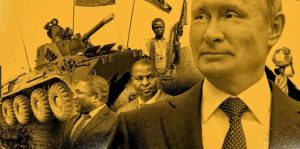In 2018 Russia has quickly developed ties with the Central African Republic (CAR) through the signing of a defence co-operation agreement and the hosting of talks between rival militias from that country, like reported by ountry.eiu.com.
Access to natural resources and potential sales of Russian weaponry appear to explain Russia’s actions. These developments fit in with Russia’s willingness to reassert its presence on the global stage, with the aim of equality with the US in this respect and, in Africa, to provide a counterweight to traditional Western powers and to China.
In late August Russia and Sudan hosted talks in Khartoum, the Sudanese capital, between a number of rival militias from the CAR. This resulted in the signing of a declaration of understanding between those present, including three ex-Séléka rebel groups (mainly Muslim) and the head of the largest Christian armed groups, the anti-Balaka. The agreement is believed to have committed the groups to respect human rights and ensure the free movement of humanitarian organisations. The agreement also endorsed the African Union (AU) mediation mission, which is recognised by the UN and the CAR’s government. The AU ran a parallel meeting at the end of August to establish a framework for militias (at least 14 rebel groups are believed to be active in the country) to engage with the CAR government. However, rival ex-Séléka factions are operating almost independently and without a clear chain of command, weighing on the prospects of achieving a lasting peace agreement.
Russia’s involvement in the militia talks illustrates an increasing boldness in its relations with the CAR, and Africa in general. This has developed rapidly during 2018. In December 2017 Russia won an exemption from the UN arms embargo to provide small arms and ammunition to the CAR’s military. Russia delivered this assistance early this year, and five Russian military and 170 civilian instructors were sent to train military personnel on the ground. Given that the UN’s CAR mission, MINUSCA, is overstretched and the CAR’s national army (known by its French acronym, FACA) is poorly trained and supplied, Russia has provided much-needed assistance. However, building the capacities of the CAR’s armed forces will take time, especially given the complex security picture in the country.
Russia’s role goes further than arms donations
In August Russia and the CAR signed a military co-operation agreement. This was described by Alexander Fomin, the Russian deputy defence minister, as a framework agreement for co-operation, including exchanges of delegations and education. Russian military personnel have been deployed to the volatile cities of Sibut and Bangassou in support of the CAR armed forces. They are escorting convoys to carry materials to build hospitals and are also guarding existing Russian-donated hospitals.
Natural resources and selling Russian weaponry are the motives
A significant motivation for Russia relates to natural resources and mining interests—including timber, gold, diamonds and uranium—in the CAR. Russia has been explicit about this. After a meeting in October 2017 between Sergei Lavrov, the Russian foreign minister, and the CAR’s president, Faustin-Archange Touadéra, in Sochi, a Russian sea resort, the Russian foreign ministry noted Russia’s interest in “mutually beneficial development of Central African natural resources”. Vladimir Putin, the Russian president, met Mr Touadéra in the Russian city of St Petersburg in May 2018; after the meeting, Mr Putin reiterated Russia’s desire to boost bilateral economic relations. Russia may be hedging this interest by conducting negotiations with rebel groups, as these control some of the resource-rich parts of the CAR. This is despite the CAR’s preference for the AU-led negotiations; this strategy could prove a source of tension between the CAR government and Russia.
Russia also is keen to provide Russian weaponry (as has been the case in Syria) to the conflict-torn CAR, with the hope of future arms deals should the situation stabilise. However, there is a risk that the weapons already supplied to the CAR under the UN exemption could contribute to further instability. In August a UN panel of experts noted that the UN-approved supply of weapons to the CAR military had led rebels to rearm by procuring more weapons in Sudan.
Counterbalancing Western and Chinese influence
Russia’s new interest in the CAR is indicative of Russia’s willingness to increase its influence on the African continent and to counterbalance the influence of traditional powers such as the US, the UK and France. In addition, by filling a security and defence gap in African countries in conflict or in those recovering from conflict, Russia is positioning itself for future economic gains at a time when the West appears to be focusing on migration and security in its relations with African countries. Finally, Russia also provides a counterbalance to Chinese influence, which has increased in recent years owing to China’s large-scale infrastructure Belt and Road Initiative. In view of the construction since early 2018 of a Chinese base in Djibouti, and with the announcement in September by the Chinese president, Xi Jinping, of US$60bn in financial support to Africa, Russia appears eager to be seen as a serious alternative player in the region.
Not just about the CAR
Aside from recent military co-operation agreements with the Democratic Republic of Congo, Ethiopia, Guinea, Mozambique and Morocco, Russia reached an agreement in late August to build a logistics base in Eritrea. If it is built, such a base would give the Russian naval forces access to the Red Sea. Russia has also renewed ties with Egypt, recently signing agreements to establish a Russian Industrial Zone; to build a nuclear-power plant; and to supply helicopters and MiG-29 fighter jets. Russia has also offered military training to Sudan’s armed forces. These developments indicate Russia’s interest—and, so far, its success—in bolstering its presence in Africa.



